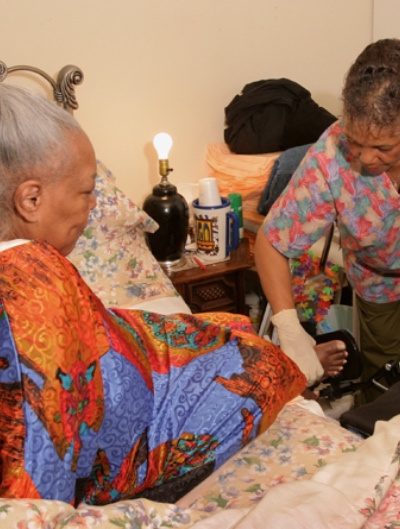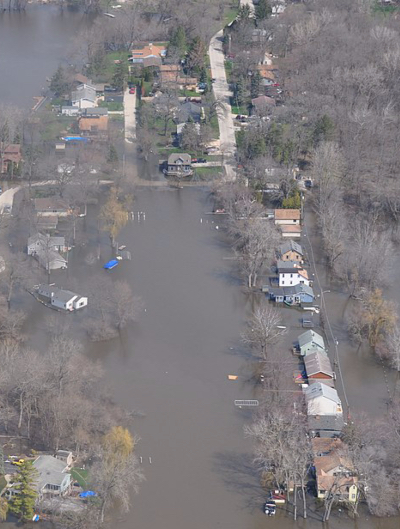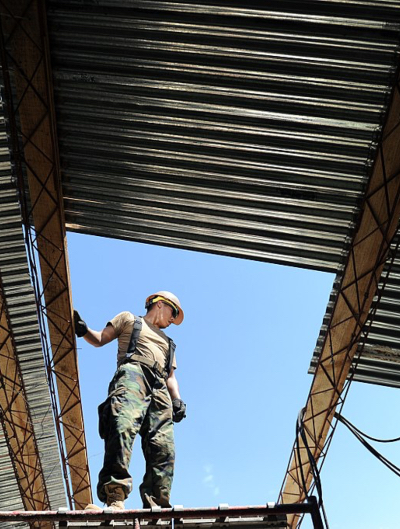Policy Briefs
Better Training Will Improve the Health of Homecare Aides & Their Clients

By Jing Zhang, PhD, senior research specialist, environmental and occupational health sciences; Marsha Love, instructor, environmental and occupational health sciences; and Dr. Susan Buchanan, clinical associate professor, environmental and occupational health sciences.
One of every 8 Illinoisans is over age 60. This number will rise to 1 in 5 by 2030. By 2030, Illinois is expected to have a 76% gain in the population aged 65 to 74, an 80% gain in those aged 75 to 84, and a 65% gain in those over 85. Nationally, Census Bureau projections predict continuing increases in the older adult population. With many older adults prefer staying in their own communities for long-term care. the role of homeware aides is increasing in importance. However, homecare aids are generally underpaid and lack training to communicate with older adults with dementia, depression or memory loss. Facing a variety of physical and mental health risks from their work, this brief recommends homecare aides need revised training curricula that include skills and resources necessary to reduce work-related injuries and health hazards.
Illinois Should Create a Climate Change Task Force for the State

By Elena Grossman, research specialist, environmental and occupational health sciences and Caitlin Donato, research associate, environmental and occupational health sciences.
Climate change is affecting Illinois’ health, agriculture, transportation, infrastructure, and the economy. Rising temperatures and increasing precipitation are leading to a variety of negative health outcomes and increased stress on transportation infrastructure. Flooding risks are threatening agricultural losses, and labor productivity faces potential declines as heat rises past human comfort levels. To address these issues, the authors recommend the state should create a Climate Change Taskforce to develop a comprehensive climate change adaptation plan to assess how climate change affects different sectors and strategies to reduce the impact.
Illinois Should Develop a Comprehensive State Asthma Plan That Addresses “Upstream,” Root Cause Environmental Contributors

By Susan Kaplan, JD, research assistant professor of environmental and occupational health sciences.
This policy brief calls for Illinois to develop a comprehensive approach to its 2021-2025 asthma plan that addresses the range of indoor and outdoor environmental contributors to asthma. The state should include, but also go beyond, the 2015-2020 plan’s focus on asthma management and treatment, and on home-based education and interventions. The new plan should expand its focus on prevention and bring together all local, state and federal organizations whose actions impact asthma.
Workers’ Compensation Should Protect the Illinois Workforce

By Dr. Linda Forst, senior associate dean; Emily Szwiec, research associate; and Tessa Bonney, MPH in Health Policy and Administration ’16, PhD in Environmental and Occupational Health Sciences student.
Illinois workers’ compensation (WC) laws allow employees injured on the job to obtain medical care, wage replacement, and disability benefits. But the high cost of these benefits is a hot-button issue for Illinois governors, legislators, businesses and voters. Some argue that high insurance premiums, paid leave and high settlements are driving businesses and jobs out of Illinois. Others note that the law is not protective enough for workers and does not incentivize injury prevention. This policy brief argues the state government needs to review the Illinois Workers’ Compensation System to maximize potential to prevent injuries and reduce costs.